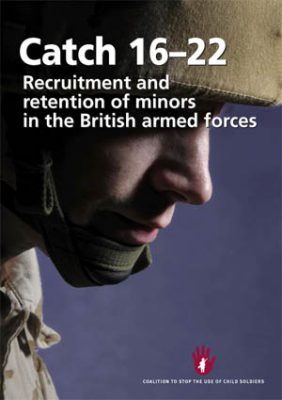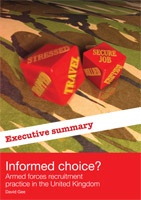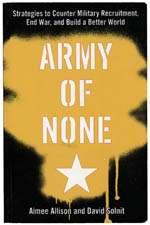Before you enlist: the film
2018 update, USA
Catch 16-22: Recruitment and retention of minors in the British Armed Forces
March 2011
 This report, published by the Coalition to Stop the Use of Child Soldiers, "challenges the status quo currently surrounding the situation of young people in the UK armed forces today. It questions the ethics and legality of the restrictions on young recruits’ rights of discharge, their minimum period of service, and their exposure to the risk of hostilities. The report also makes the case for a considered review and debate on the minimum recruitment age. It highlights the evidence that not only is the experience of recruits in the 16 – 18 age bracket adversely affected by their relative lack of maturity, but that their high drop-out rate results in millions of pounds in wasted expenditure."
This report, published by the Coalition to Stop the Use of Child Soldiers, "challenges the status quo currently surrounding the situation of young people in the UK armed forces today. It questions the ethics and legality of the restrictions on young recruits’ rights of discharge, their minimum period of service, and their exposure to the risk of hostilities. The report also makes the case for a considered review and debate on the minimum recruitment age. It highlights the evidence that not only is the experience of recruits in the 16 – 18 age bracket adversely affected by their relative lack of maturity, but that their high drop-out rate results in millions of pounds in wasted expenditure."
Procedure for registering a conscientious objection
Information on registering a conscientious objection in the UK armed forces.
Informed Choice? Armed forces recruitment practice in the United Kingdom
November 2007
 An independent report by David Gee, published in 2007, highlighting the risks posed to young people through joining the military, how young people from disadvantaged communities are targeted, how information available to potential recruits is often misleading and how the terms of service are complicated, confusing and severely restricting. The research found that a large proportion join for negative reasons, including the lack of civilian career options.
An independent report by David Gee, published in 2007, highlighting the risks posed to young people through joining the military, how young people from disadvantaged communities are targeted, how information available to potential recruits is often misleading and how the terms of service are complicated, confusing and severely restricting. The research found that a large proportion join for negative reasons, including the lack of civilian career options.
UK Parliamentary Joint Committee on Human Rights report on Children’s Rights
November 2009
In their report on Children's Rights, the UK Parliamentary Joint Committee on Human Rights recommended that the 'UK adopt a plan of action for implementing the Optional Protocol, including these recommendations, fully in the UK, together with a clear timetable for doing so.' The UN Committee on the Rights of the Child recommendations under the Optional Protocol were that the UK 'reconsider its active policy of recruitment of children into the armed forces' and a number of other measures.
Army of None
2007
 Strategies to counter military recruitment, end war, and build a better world by Aimee Allison and David Solnit, 2007
This is a book from the heart of the vibrant counter recruitment movement in the United States. It looks at the many ways in which schools and communities have become targets for military recruiters and how those schools and communities have responded - with a powerful movement that seeks to resist the militarisation of young people.
Strategies to counter military recruitment, end war, and build a better world by Aimee Allison and David Solnit, 2007
This is a book from the heart of the vibrant counter recruitment movement in the United States. It looks at the many ways in which schools and communities have become targets for military recruiters and how those schools and communities have responded - with a powerful movement that seeks to resist the militarisation of young people.
Reimagining Remembrance
2009
In this report, the think-tank Ekklesia, argue that Remembrance Day needs to be re-imagined to make it more inclusive, more truthful and more meaningful for future generations, says this report. This would include an honest acknowledgement that some did “die in vain”, an end to “selective remembrance”, a positive stress on peacemaking, and making Armistice Day a bank holiday.
The report follows the death of the 'last Tommy', Harry Patch from World War 1, who sadly described current patterns of Remembrance Day as “just show business”.
United Nations Convention on the Rights of the Child and the Optional Protocol on the Involvement of Children in Armed Conflict
October 2008
The UK remains the only EU country to recruit 16 year olds into the military and one of very few EU countries to recruit 17 year olds. The UK has signed the Optional Protocol to the Convention on the Rights of the Child on the Involvement of Children in Armed Conflict yet there is evidence that the UK continues to target children from vulnerable groups and that safeguards to protect under-18s are not effective.
Winter Soldier
2008
Army recruiters visit London’s poorest schools most often
January 2010
This research published in 2010 has found that the army visited 40% of London schools from September 2008 to April 2009 and disproportionately visits schools in the most disadvantaged areas. The researchers conclude that, “the army's recruitment activities in schools risk jeopardising the rights and future welfare of the young people contacted.
